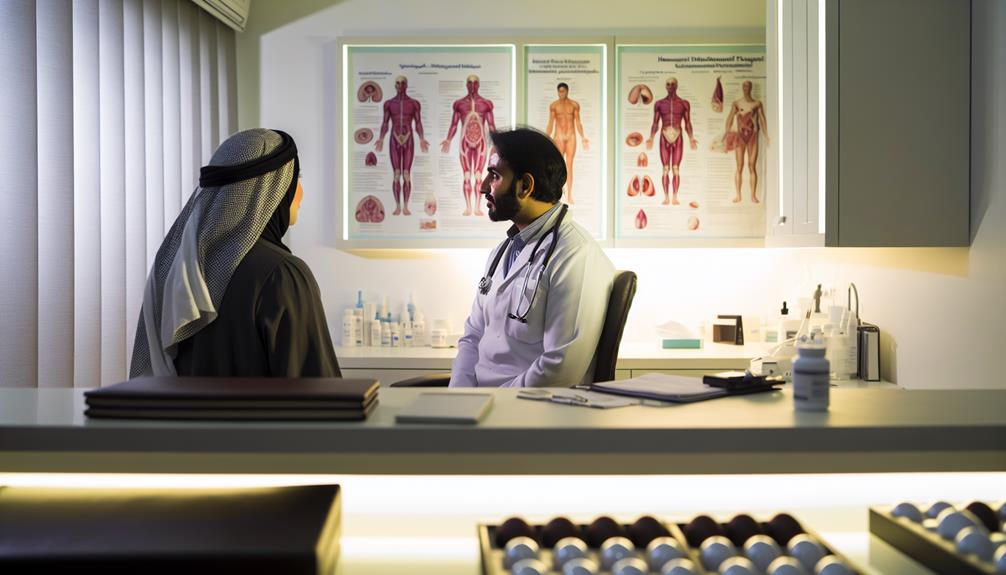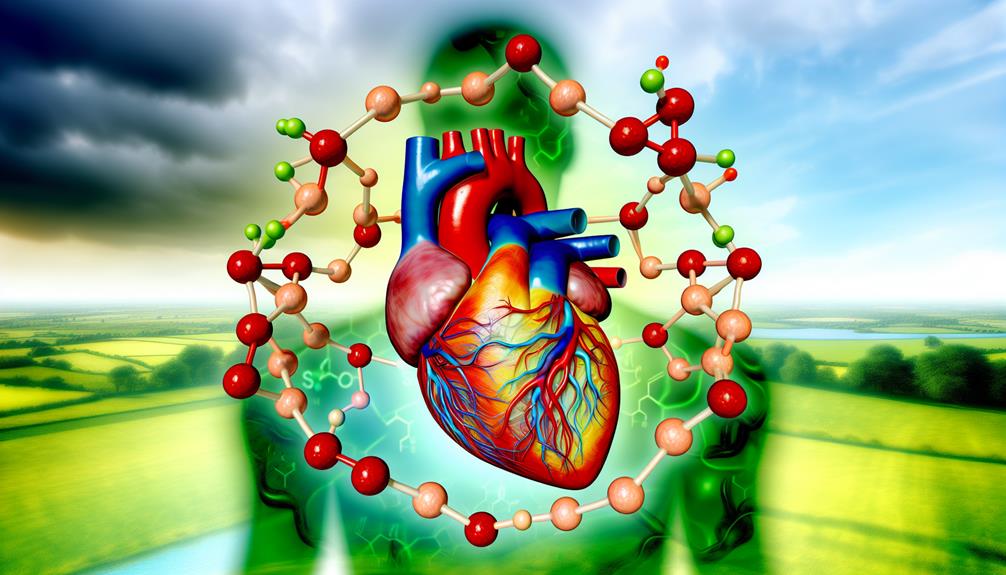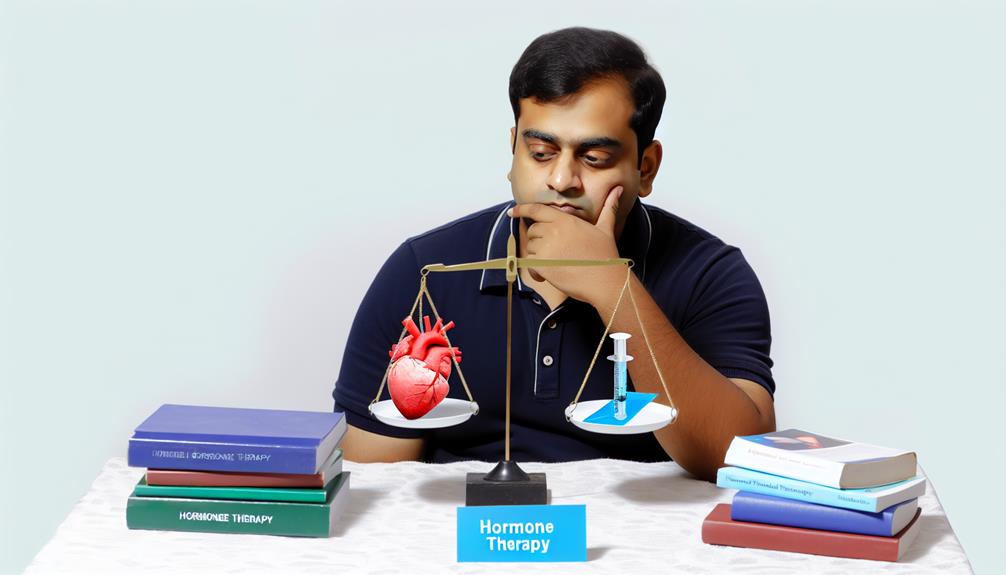I've found that hormone therapy, especially testosterone replacement, offers benefits like increased muscle mass, enhanced libido, and improved mood. However, it comes with risks, particularly cardiovascular complications and a heightened likelihood of blood clots. Monitoring testosterone levels is crucial to mitigate side effects such as weight gain and sleep disturbances. Long-term use can raise concerns regarding prostate health and overall cardiovascular risk, making regular check-ups essential. Lifestyle factors also play a critical role in therapy effectiveness. Understanding both sides empowers informed decisions, and there's much more to uncover about managing these therapies effectively.
Understanding Hormone Therapy

Hormone therapy for men involves the use of specific hormones, primarily testosterone, to address various health issues related to hormonal imbalances. I've learned that testosterone regulation is vital for maintaining overall health, as it impacts not just physical characteristics, but also mental well-being and metabolic functions. Low testosterone levels can lead to symptoms such as fatigue, depression, and reduced libido, which can notably affect a man's quality of life.
Understanding how hormone therapy works is essential for anyone considering this treatment. The primary goal is to restore hormonal balance in the body. This can involve different methods, including injections, transdermal patches, or gels. Each method has its own pharmacokinetics, influencing how testosterone is absorbed and utilized by the body. For example, injections may provide a more considerable surge in testosterone levels, while transdermal applications offer a more stable release.
It's important to note that while hormone therapy can be beneficial, it also carries potential risks. Monitoring testosterone levels and overall health is critical during treatment to avoid complications such as polycythemia, cardiovascular issues, and prostate health concerns. As a result, I always recommend consulting with a healthcare provider to assess individual needs and risks. Hormone therapy can be a valuable tool for restoring testosterone levels and improving quality of life, but it must be approached with caution and a thorough understanding of the implications involved.
Common Types of Hormone Therapy
When exploring the common types of hormone therapy, it's essential to recognize the various administration methods available to men seeking testosterone replacement. Each method has unique advantages and can be tailored to individual needs, particularly when considering factors like hormone balance and any underlying conditions such as adrenal insufficiency or thyroid management.
Here's a brief overview of the common types of hormone therapy:
| Type of Therapy | Description |
|---|---|
| Testosterone Replacement | Administered via injections, patches, gels, or pellets to elevate testosterone levels. |
| Estrogen Therapy | Sometimes prescribed for specific conditions; needs careful management due to potential side effects. |
| Peptide Hormones | Includes therapies like human growth hormone, which can aid in muscle growth and metabolism. |
Additionally, some men turn to anabolic steroids to enhance muscle mass, but these can pose significant risks, including fertility concerns. It's essential to approach any hormone therapy with a clear understanding of the implications and to consult with a healthcare provider to monitor any potential side effects.
The choice of therapy should be guided by an extensive assessment of one's health, lifestyle, and specific hormone-related issues. Each therapy type plays a distinct role in managing hormonal health, and understanding these options is critical for making an informed decision.
Benefits of Hormone Therapy

Exploring the various types of hormone therapy highlights their potential benefits for men facing hormonal imbalances. One of the most notable advantages is muscle growth. Research indicates that testosterone therapy can increase muscle mass and strength, particularly in men with low testosterone levels. This is essential for maintaining overall physical health, especially as I age. The anabolic effects of testosterone promote protein synthesis, leading to improved muscle hypertrophy when combined with resistance training.
Additionally, hormone therapy can lead to libido enhancement. Many men experience a decline in sexual desire as they age or due to hormonal imbalances. Testosterone replacement therapy has been shown to effectively restore libido in men. Studies reveal that men undergoing this treatment often report increased sexual interest and improved erectile function, which can greatly enhance quality of life and intimacy in relationships.
Moreover, hormone therapy may also contribute to improved mood and cognitive function. Men undergoing testosterone therapy often report reduced symptoms of depression and anxiety, as well as enhanced cognitive clarity. This is particularly relevant for those who may be experiencing mood swings or cognitive decline associated with low testosterone levels.
Risks Associated With Hormone Therapy
While the benefits of hormone therapy can be compelling, it's essential to weigh the associated risks that may arise. Hormone therapy can lead to hormone imbalances, which might necessitate careful patient monitoring. Not everyone responds the same way to treatment options, meaning that side effects can vary considerably. For instance, while some may experience increased muscle mass and improved energy levels, others might face unwanted effects such as weight gain, acne, or sleep disturbances.
It's vital to take into account that dosage adjustments could be necessary over the course of therapy. This is where healthcare guidance becomes invaluable; regular check-ups can help identify any adverse effects early on, allowing for timely modifications to the treatment plan. The duration of therapy also plays a role in determining potential risks, as long-term use has been linked to more serious complications, including cardiovascular issues and prostate health concerns.
Lifestyle factors can further complicate the risk profile associated with hormone therapy. Factors like diet, exercise, and overall health can influence individual responses to treatment. Furthermore, the psychological effects of hormone therapy, although not the focus here, shouldn't be overlooked, as they can intertwine with physical health.
Ultimately, the decision to pursue hormone therapy should not be made lightly. It's a balancing act between managing the risks and reaping the benefits, and I can't stress enough the importance of discussing these factors with a qualified healthcare provider to guarantee a safe and effective treatment journey.
Impact on Mood and Mental Health

Hormone therapy can considerably influence mood and mental health, a factor that often intertwines with the physical effects discussed earlier. For many men, the adjustments in hormone levels can lead to noticeable changes in emotional stability and cognitive function. I've seen firsthand how these shifts can either alleviate or exacerbate conditions like anxiety and depression.
A well-structured hormone therapy regimen can promote anxiety reduction and improve depression management, ultimately enhancing overall well-being. However, it's essential to recognize potential mood swings that some individuals may experience during the adjustment period. Maintaining mental clarity becomes essential, as emotional responses may fluctuate.
Here's a visual representation of the impact of hormone therapy on mood and mental health:
| Benefits | Potential Risks | Overall Impact |
|---|---|---|
| Emotional stability | Mood swings | Enhanced overall well-being |
| Anxiety reduction | Increased irritability | Improved mental clarity |
| Depression management | Short-term emotional instability | Better cognitive function |
It's important to approach hormone therapy with a thorough understanding of these dynamics. Monitoring your mood and mental health during treatment is crucial, as it can guide adjustments and improve your experience. Ultimately, the goal is to achieve a balance that not only enhances physical health but also supports a stable emotional landscape, contributing to a better quality of life.
Effects on Physical Performance
Over time, I've observed that hormone therapy considerably influences physical performance in men, affecting strength, endurance, and recovery. When testosterone levels are maximized, men often experience notable improvements in muscle mass and overall athletic performance. This therapy can enhance the body's ability to engage in endurance training, leading to better stamina during high-intensity workouts.
One significant aspect is how hormone therapy contributes to hormonal balance, which is vital for maximizing strength gains. Higher testosterone levels can lead to increased energy levels, allowing for more effective training sessions. Additionally, an improved metabolic rate supports weight management, making it easier for men to maintain an ideal body composition.
Key benefits I've noticed include:
- Enhanced muscle mass: A direct result of increased testosterone, leading to improved strength.
- Reduced recovery time: Faster healing from workouts can keep you training consistently.
- Injury prevention: Improved muscle and joint function lowers the risk of injuries during physical activities.
- Increased energy levels: Higher testosterone can boost motivation and performance in the gym.
It's essential to note that while hormone therapy can provide these advantages, individual responses may vary. Monitoring and adjusting therapy with a healthcare professional is key to ensuring peak results. Overall, the positive effects on physical performance can be a compelling reason for men to evaluate hormone therapy as part of their fitness strategy.
Hormone Therapy and Cardiovascular Health

As I examine the relationship between hormone therapy and cardiovascular health, it's essential to reflect on how hormone levels impact heart function. Research indicates that alterations in testosterone can influence cardiovascular risk factors, including the potential for blood clots. Understanding these dynamics is vital for evaluating the overall safety of hormone therapy in men.
Hormone Levels and Heart
The relationship between hormone levels and cardiovascular health is crucial, particularly for men evaluating hormone therapy. I've come to understand that maintaining an ideal balance of hormones, especially testosterone and estrogen, can greatly impact heart health. Testosterone fluctuations can affect blood pressure, lipid profiles, and overall cardiovascular risk. Similarly, an appropriate estrogen balance is essential, as it plays a role in vascular function.
Here are some key points to reflect on:
- Testosterone and Heart Health: Low testosterone levels may correlate with increased cardiovascular events.
- Estrogen's Protective Role: Adequate estrogen levels can help maintain vascular elasticity and reduce arterial stiffness.
- Impact of Fluctuations: Hormone fluctuations can lead to mood swings and other side effects that might indirectly affect heart health.
- Monitoring Levels: Regular monitoring of hormone levels is crucial for evaluating risks and adjusting treatment regimens.
Understanding these dynamics can help you make informed decisions about hormone therapy. By reflecting on hormone levels and their implications for cardiovascular health, you can better manage your overall well-being and minimize potential risks associated with therapy.
Risks of Blood Clots
While considering hormone therapy, it's essential to be aware of the potential risks, particularly the increased likelihood of blood clots. Research indicates that hormone therapy can lead to enhanced clot formation, which may considerably elevate the risk of venous thromboembolism (VTE). In my assessment, it's imperative to evaluate individual risk factors such as age, obesity, smoking status, and existing cardiovascular conditions, as these can compound the dangers associated with hormone therapy.
A study published in a prominent medical journal highlighted that men undergoing testosterone therapy faced a two to threefold increase in the risk of developing clots when compared to non-users. The mechanisms behind this phenomenon often relate to testosterone's effects on blood viscosity and platelet function.
If you already possess risk factors for clotting—like a history of deep vein thrombosis or pulmonary embolism—it's essential to consult your healthcare provider before initiating therapy. They may recommend monitoring strategies or alternative treatments. Ultimately, understanding these risks allows us to make informed decisions, balancing the benefits of hormone therapy against potential complications like blood clots.
Long-Term Health Considerations
As I consider the long-term health implications of hormone therapy, it's essential to examine its effects on cardiovascular health and bone density. Research indicates that while some men may experience improved cardiovascular outcomes, others could face increased risks. Additionally, changes in bone density warrant careful monitoring to prevent potential fractures and osteoporosis later in life.
Cardiovascular Health Impact
Hormone therapy for men can greatly influence cardiovascular health, raising important long-term health considerations. It's vital to understand how testosterone levels and estrogen effects interplay, particularly concerning heart disease and metabolic syndrome. My observations reveal that maintaining cholesterol balance and enhancing vascular function are essential components of a successful treatment plan.
Here are some key considerations:
- Inflammation markers: Elevated levels can indicate increased cardiovascular risk.
- Lifestyle factors: Diet, exercise, and smoking markedly affect heart health and should be integrated into treatment guidelines.
- Risk assessment: Regular evaluations help identify potential cardiovascular complications early.
- Testosterone therapy: This can improve metabolic profiles but also requires careful monitoring to avoid adverse effects.
Bone Density Changes
Maintaining bone density is essential for overall health, particularly as men age and testosterone levels fluctuate. Research indicates that testosterone plays a vital role in bone health, influencing bone density and strength. As I explore hormone therapy, I've found that it can have a significant impact on long-term bone density changes.
Men undergoing hormone therapy often experience varying effects on their bone density. On one hand, testosterone replacement may help mitigate osteoporosis risk by enhancing bone mineral density. Studies suggest that men with low testosterone levels are at a heightened risk for developing osteoporosis, a condition characterized by weakened bones and increased fracture risk.
Conversely, the long-term implications of hormone therapy are not fully understood, and some studies have pointed to potential risks, including changes in bone metabolism that could lead to adverse effects. Monitoring bone density through regular scans can provide important insights into how therapy is affecting my bone health.
Age-Related Hormonal Changes

With the passage of time, men experience significant hormonal shifts that can impact their overall health and well-being. One of the most notable changes is the gradual decline in testosterone levels, often referred to as testosterone decline. This decline can lead to various aging effects, including decreased muscle mass, increased body fat, and diminished libido. As the endocrine system ages, hormonal imbalances become more prevalent, which can further affect men's quality of life.
It's imperative to recognize the various age factors and lifestyle influences that contribute to these changes. Health monitoring becomes essential as men age, allowing for early detection of potential issues. Here are some key points to reflect on:
- Testosterone levels typically peak in early adulthood and begin declining around age 30.
- Hormonal imbalances can lead to mood swings, fatigue, and cognitive decline.
- Lifestyle factors, such as diet and exercise, play a significant role in mitigating the effects of aging.
- Regular health monitoring can help address issues before they escalate.
Understanding these age-related hormonal changes is significant for men looking to maintain their health as they age. By staying informed about testosterone decline and its implications, we can take proactive steps to improve our well-being and enhance our quality of life.
Alternatives to Hormone Therapy
Many men may seek alternatives to hormone therapy as they navigate the challenges of age-related hormonal changes. I've found that exploring natural supplements can be a beneficial first step. For instance, ingredients like DHEA and ashwagandha have shown promise in supporting hormonal balance. However, it's essential to consult with a healthcare provider before starting any supplementation.
Incorporating lifestyle modifications can also yield significant benefits. Simple dietary changes, such as increasing the intake of healthy fats found in avocados and nuts, can support overall hormone production. Additionally, reducing sugar and processed foods may help regulate insulin levels, which can indirectly affect testosterone levels.
Developing a consistent exercise routine is another effective strategy. Resistance training and high-intensity interval training (HIIT) are particularly beneficial for boosting testosterone levels. I've noticed that regular physical activity not only enhances my physical health but also improves my mood and energy levels.
Stress management techniques are essential as well. Chronic stress can elevate cortisol levels, which negatively impacts hormone balance. Practices like mindfulness, meditation, and yoga can help mitigate stress and promote a sense of well-being.
Lastly, exploring alternative therapies, such as acupuncture or massage, may provide relief from symptoms associated with hormonal changes. Herbal remedies like ginseng and fenugreek have also been researched for their potential hormonal benefits. By combining these strategies, I believe many men can find effective alternatives to hormone therapy, improving their quality of life without relying solely on medical interventions.
Making an Informed Decision

When considering hormone therapy, it's crucial to weigh the benefits and risks carefully. As someone who values informed decision-making, I understand the importance of being fully educated about the options available. The concept of informed consent is essential here; I need to know what I'm signing up for, including potential side effects and long-term implications.
To guide my decision, I focus on a few key points:
- Understand the specific hormones involved: Knowing whether testosterone, estrogen, or other hormones are used helps clarify the treatment's purpose.
- Assess personal health history: My individual medical background will influence how I respond to therapy and the associated risks.
- Consider lifestyle factors: Weight, exercise habits, and diet can considerably impact the effectiveness and safety of hormone therapy.
- Engage in open dialogue with healthcare providers: Active patient education is crucial. I should feel comfortable discussing my concerns and preferences with my medical team.
Informed consent isn't just a form to sign; it's an ongoing conversation that empowers me to make educated choices. By prioritizing patient education, I can better navigate the complexities of hormone therapy and its implications for my health. This approach guarantees that I'm not only making a decision but one that aligns with my values, needs, and understanding of the treatment landscape. Ultimately, being well-informed allows me to take charge of my health in a responsible and proactive manner.
Frequently Asked Questions
How Does Hormone Therapy Affect Fertility in Men?
When considering how hormone therapy affects fertility in men, I've found that it often leads to reduced sperm production. This decline can be significant depending on the type and dosage of hormones used. If fertility preservation is important to you, it's essential to discuss options like sperm banking before starting treatment. Understanding these impacts can help you make informed decisions regarding your reproductive health while undergoing hormone therapy.
Can Hormone Therapy Lead to Weight Gain?
I've found that hormone therapy can indeed lead to weight gain due to hormone fluctuations and metabolic changes. When testosterone levels are altered, it can affect how the body processes fat and builds muscle. This can result in an increase in body fat percentage, especially if lifestyle factors aren't adjusted accordingly. It's important to monitor these changes and consult with a healthcare professional to manage any potential weight-related issues effectively.
What Is the Cost of Hormone Therapy Treatments?
Have you ever wondered how much your health is really worth? The cost of hormone therapy can vary widely based on factors like treatment duration and insurance coverage. Typically, monthly expenses can range from $100 to $500 without insurance. With coverage, your out-of-pocket costs could markedly decrease, making it more accessible. Always consult with your healthcare provider to understand the specifics of your treatment plan and what your insurance might cover.
How Do Lifestyle Factors Influence Hormone Therapy Outcomes?
I've found that lifestyle factors greatly influence hormone therapy outcomes. Lifestyle modifications, like consistent exercise, can enhance the effectiveness of treatment by improving overall health and hormone levels. Stress management techniques help mitigate cortisol spikes, which can negatively affect hormonal balance. Additionally, prioritizing sleep quality is essential, as restorative sleep aids in hormone regulation. By focusing on these areas, I believe we can maximize the benefits of hormone therapy effectively.
Are There Specific Dietary Recommendations While on Hormone Therapy?
Did you know that nearly 50% of people on hormone therapy report improved outcomes with dietary adjustments? While on hormone therapy, I prioritize meal planning to guarantee I'm consuming balanced nutrients. Incorporating dietary supplements like omega-3 fatty acids and vitamin D can support hormonal balance. I focus on whole foods, lean proteins, and healthy fats, which not only fuels my body but may also enhance the effectiveness of my treatment.
